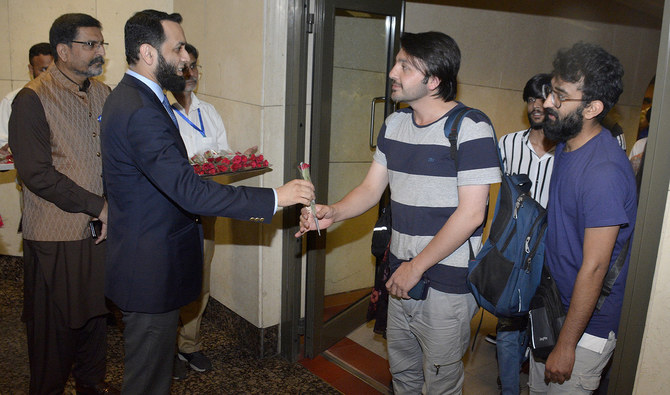ISLAMABAD: Trafficking and illegal sale of North Atlantic Treaty Organization (NATO) and Soviet arms have continued in Afghanistan and Pakistan’s border regions more than three years after the Taliban’s takeover of Kabul and their seizure of the previous regime’s stockpiles, a Geneva-based monitor Small Arms Survey has said in its recent report.
The report, titled “Documenting Arms Availability in Afghanistan,” said as of August 2021, Afghanistan had 258,300 rifles, including M4, M16 and AK-variants, 64,300 pistols, 63,000 sniper rifles, 56,155 light, medium and heavy machine guns, 31,000 grenade launchers, 9,115 shotguns, 1,845 rounds of 60-82mm, as well as hundreds of thousands of accessories and munitions.
The paper reviewed field investigations conducted from 2022 to 2024 into the availability and prices of small arms, light weapons, accessories, and ammunition at informal markets in the Afghanistan–Pakistan border areas. It found that cross-border trafficking was more of a “slow drip” than a flood, with both newer NATO- and older Soviet-pattern weapons still accessible in Afghanistan’s eastern provinces and Pakistan’s tribal districts.
While weapons management practices have improved over the past three years, their application remains inconsistent across provinces and communities, with institutional weaknesses, including limited technical capacity and reliance on paper-based systems, undermining the Taliban’s control efforts, according to the report. Diversion to illicit markets and the “deliberate provision of weapons to various non-state armed groups” remain significant concerns.
“More than three years after the Taliban’s takeover and their seizure of the previous regime’s weapons stockpiles, the de-facto authorities have strengthened control over commanders and restricted civilians’ and private businesses’ access to arms,” the report, published late last month, read.
“Arms trafficking has continued — likely with at least the tacit approval of low-level Taliban officials — and evidence suggests the continued arming of UN Security Council-designated terrorist groups, including the Tehreek-e-Taliban Pakistan (TTP) and Al-Qaeda, alongside efforts to acquire conventional weapons systems on international markets.”
Many local commanders in Afghanistan view weapons obtained during the insurgency as personal property, or property of their respective fighting group, and therefore resist efforts to register and manage these arms centrally, according to the report.
Additionally, internal divisions within the Taliban, along with the personal networks of commanders, provide informal pathways to acquire weapons, bypassing formal approval processes. These challenges led to significant variations in control practices from province to province based on the influence of local commanders and their relationship with Afghan central authorities.
“When comparing prices in Pakistan with those in Afghan border provinces, US M4 rifles cost between USD3,325 and USD 3,700 in Pakistan, making them cheaper than in Khost and Nangarhar on the Afghan side but slightly more expensive than in Kunar, Paktia, and Paktika,” it read.
“In general, the wide variety in price is likely indicative of the condition of the weapons and their origin; sophisticated replicas may have also accounted for some of the lower-priced models. M16 rifles, however, are significantly less expensive in Pakistan, at an average price of between USD1,245 and USD1,400, compared to USD1,824–3,065 in Afghanistan... Conversely, Russian AK-pattern rifles are notably more expensive in Pakistan.”
In Jan. this year, Pakistan voiced “profound concern” over the presence of advanced US weapons in Afghanistan, which Washington has sought to be returned by Kabul’s Afghan Taliban rulers.
“The presence of US advance weapons in Afghanistan, left behind in the aftermath of the withdrawal of its troops in August 2021, has been an issue of profound concern for the safety and security of Pakistan and its citizens,” the Pakistani foreign office said in a statement.
“These weapons have been used by terrorist organizations, including the TTP [Tehreek-e-Taliban Pakistan], to carry out terrorist attacks in Pakistan.”
The statement came months after Pakistani security officials said custom authorities had seized a large cache of US-made weapons and ammunition worth approximately Rs35 million ($125,000) at a border crossing between Pakistan and Afghanistan. The weapons seized at the Torkham border crossing in Pakistan’s northwestern Khyber Pakhtunkhwa (KP) province included M4 rifles and magazines, security sources said in Oct. last year.
Pakistan has struggled to contain surging militancy in KP since a fragile truce between the Pakistani Taliban, or the TTP, and the state broke down in November 2022.
The TTP and other militant groups have frequently targeted security forces convoys and check-posts, besides targeted killings and kidnappings of law enforcers and government officials in recent months. In 2024 alone, the Pakistani military reported that 383 soldiers and 925 militants were killed in various clashes.
Islamabad has frequently blamed the surge in militancy on Afghanistan, accusing it of sheltering and supporting militant groups that launch cross-border attacks. Afghan officials deny involvement and insist that Pakistan’s security issues are an internal matter of Islamabad.


















